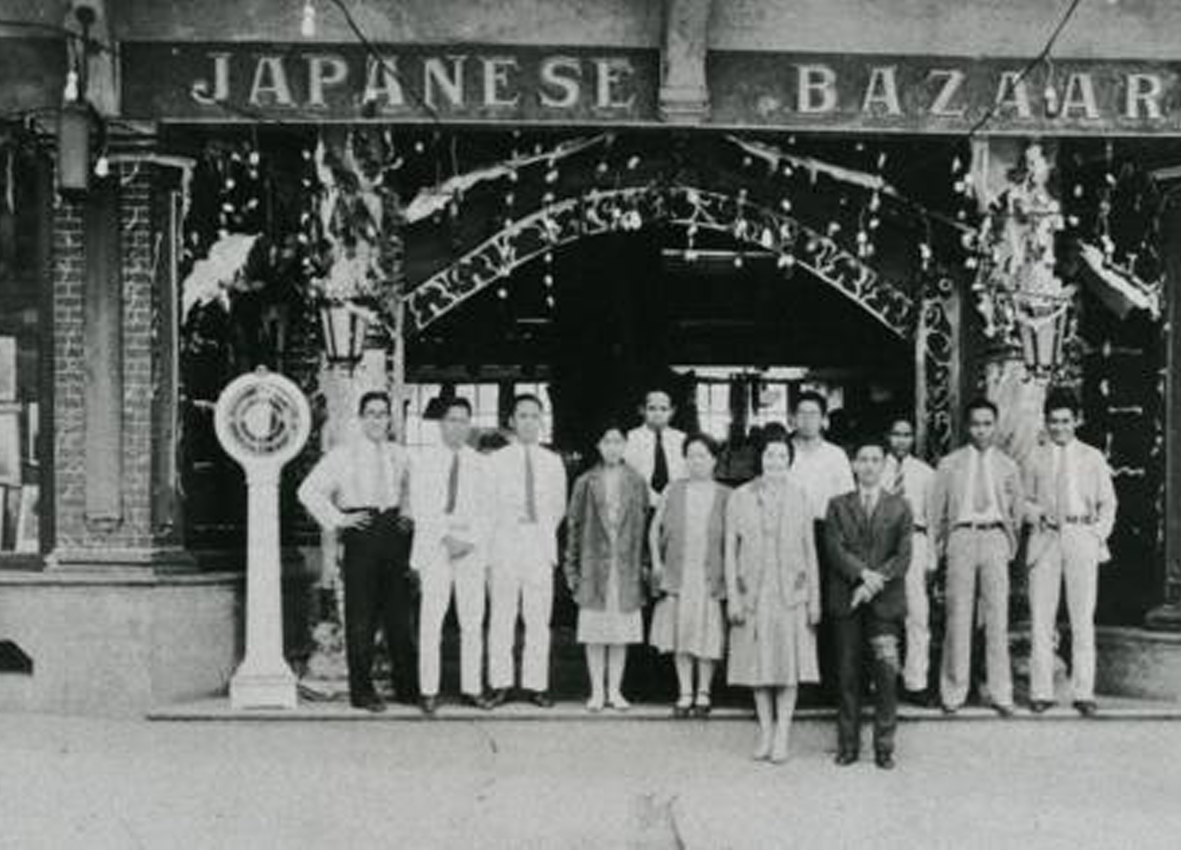 A Japanese bazaar founded in the city of Baguio, Luzon, the Philippines, is seen in this photo believed to be taken around 1930. (Photo courtesy of Philippine Nikkei-jin Legal Support Center)
A Japanese bazaar founded in the city of Baguio, Luzon, the Philippines, is seen in this photo believed to be taken around 1930. (Photo courtesy of Philippine Nikkei-jin Legal Support Center)
Exhibition of Japanese immigrants in Philippines, second generations to open in Tokyo
TOKYO - Photos and other documents will go on display at an event about the history of Japanese communities in the Philippines, in the capital's Shinjuku Ward from May 17.
The exhibition will be held by groups including the Philippine Nikkei-jin Legal Support Center (PNLSC), a nonprofit organization that provides support for second-generation Japanese-Filipinos who were separated from their Japanese fathers and lost their Japanese nationality during World War II and the subsequent turmoil.
Many Japanese who migrated to the Philippines before World War II in hopes of finding a job engaged in farmland development or road construction work. Japanese communities were formed in various places, and some men got married and had children. However, many of them died in war or were deported as the Philippine islands experienced fierce battles during the Pacific War, and their Filipino wives and children of Japanese descent were left behind.
PNLSC provides assistance for some of these second-generation Japanese-Filipinos who are still trying to find out about their fathers. But these people are having difficulties searching for their family roots because such investigations were delayed due to the effects of anti-Japanese sentiment in the Philippines during the postwar era and some relevant materials were lost in the war.
"Japanese-Filipinos who have grown old still think of Japan, wishing to know about their family roots. We want as many people as possible to know about such history and the current situation," explained a PNLSC official.
Of the approximately 3,800 second-generation Japanese-Filipinos that were identified by PNLSC, about 1,900 have already passed away. Of these, more than 560 people never discovered their family roots in Japan.
Photos taken in areas in which many Japanese immigrants settled before World War II, including the city of Davao in Mindanao and the city of Baguio in Luzon, will be displayed. Visitors will be able to see lifestyles in hemp farms, local Japanese schools and other Japanese communities back then.
A documentary film on a Japanese nun that devoted her life to helping people of Japanese descent in poverty after the war will be screened among other films.
Admission to the exhibition is free. The event will be held from 10:30 a.m. to 6 p.m. on the first floor of Eco Gallery Shinjuku, inside Shinjuku Chuo Park. The event closes at noon on May 20, the final day.
Source: https://mainichi.jp/english/articles/20190514/p2a/00m/0na/005000c
 English
English Japan
Japan

prednisone dosepak directions prednisone tablets 5 mg how long can you be on prednisone what to expect treating dog with cancer with prednisone
ivermectin walmart stromectol cream ivermectin for birds for sale how long for ivermectin to work in horses site:www.chronofhorse.com
pharmacology mechanism of action purchasing cialis in mexico cialis vs viagra 5 mg cialis for bph cialis vs viagra reviews
provigil no rx buying provigil in mexico can you order provigil online which is stronger provigil or ritalin
amoxil davis amoxicillin pink pill amoxil prescription for bronchitis how to take
kamagra oral jelly sildenafil viagra pills for men natural sexual supplements for men gold goodrx watch viagra work viagra side effects viagra prior authorization best price 100mg viagra strongest weight loss pills what is sildenafil 20 mg viagra tablets online doctor consultation with prescriptions does food affect viagra erectile dysfunction ads viagra substitute what if viagra doesn't work cialis 5 mg lowest price viagra 200mg pills generic online viagra interactions for synthroid lilly pharmaceuticals sample request form kroger drugs viagra en ligne vitamins for women's low libido ed over the counter cvs prescription drugs without prior prescription buying viagra viagra now cost of viagra cvs pharmacy drugs to increase female libido viagra otc pfizer pathways enrollment application sildenafil 100mg price
neurontin drug test buy neurontin online without perscruption who makes gabapentin
plaquenil and diarrhea plaquenil singapore dark spots covering face from plaquenil how long is plaquenil effective after discard date
lasix potassium sparing buy generic lasix online how much potassium to replace with lasix how furosemide affects cholesterol
furosemide vs lasix buy furosemide 100 mg furosemide is acidic or basic what is furosemide 40 mg tablets used for
best natural supplements for women how effective is cialis for bph citrato de sildenafila zyrtec samples list of aarp approved pharmacies
zithromax dosage pediatric azithromycin 250mg tablets zithromax z pak for sale how much does azithromycin cost
define lasix furosemide 20 mg pill mechanism of action of furosemide how much potassium for 20 mg lasix
plaquenil and coffee hydroxychloroquine 500 mg husband taking plaquenil while conceiving how is plaquenil related to dyslexia
canadian pharmacies that are safe free ed pills for men original use for viagra compra viagra fun with viagra ed supplements
azithromycin instructions zythromax azithromycin 200 mg 5 ml how long does it take to cure chlamydia with azithromycin
neurontin brand name gabapentin 214 how much neurontin can i take what are the most common side effects of gabapentin?
order priligy usa dapoxetine otc us buy viagra with priligy online where can i buy dapoxetine in usa
neurontin, gabapentin 300 mg capsule buy neurontin online without perscruption how many mg of gabapentin to get high
does male enhancement products work pictures of viagra pills walgreens viagra can i take viagra how often can i use viagra